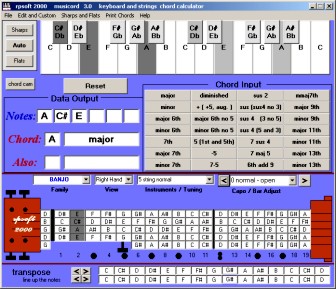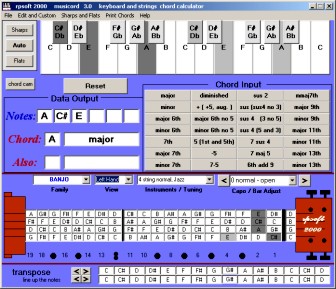| |
Forward
This page shows example usage of
rpsoft 2000 software "musicord" for banjo chord applications. To
view the main page of this software and view its main characteristics,
view it here at: musicord.
Banjo Chords in new Musicord version 3.0
While earlier Musicord programs
tried to show banjo chords using a guitar reference, in version 3.0
banjo is addressed separately and directly. The banjos are
shown as 5 string (shortened lower string) and 4 stringed instruments and a number of preset tunings are
provided. Both right handed and left handed viewings are
addressed. If none of the preset banjo tunings work for you, you
can set or retune any string to another string of your choice. You
can even save custom tunings. If you were to have a 5 string
banjo with all full length strings or a 6 string (we have never heard of those options yet
ourselves), you could also create custom tunings for those instruments.
| |
 |
|
 |
|
| |
|
|
|
|
| |
The above shows the musicord screen for a
5 string banjo, with fairly normal "G" tuning featuring an
A major chord |
|
The above shows the musicord screen
also for an A major banjo chord, but this display is for a "Jazz" tuned
left handed banjo |
|
Chords Recognized / Created
28 chords in all,
including: major, minor, major 6th, minor 6th, 7th, major 7th,
minor 7th, mmaj7th, major 9th, minor 9th, major 11th, minor 11th, major
13th, minor 13th,diminished, augmented (also called + or +5), major 6
with no 5, minor 6th with no 5, 5, -5, 7-5, sus 2, sus (sus 4 no 3),
sus4 (3 no 5), sus 4 (5 and 3), 7 sus 4, 7 maj 5, 6th add 9.
Stored Banjo Presets and Tuning (available
for right or left hand viewing)
5 string normal, 5 string G Major, 5
string D Major A low, 5 string G minor, 5 string G modal, 5 string D
Major, 5 string D minor, 5 string C tuning, 5 string Double C, 4 string
normal, Jazz, 4 string Chicago tune, 4 string Celtic tune, Banjo
Mandolin, Banjo Ukulele
Unique Tunings and
Storage of Favorite Tunings
If none of the above preset tunings will
work for you, Musicord also allows you to adjust each string to any
chromatic note you wish. And you can use this feature with 4
string, 5 string (one shortened or all five full length), and 6 string musical instruments. If you are an
artist who often uses several different tunings, you can store your
custom tunings and they will be available to you as options under the
Musical Family "Custom".
Fingering Options
Dark gray areas show
the primary (lowest possible) fingering. Light gray areas show
duplicate fingerings that could be substituted if the person wishes. For
example, one could substitute a light gray C note fingering for a dark
gray C note fingering. Substitutes may make the fingering easier,
or make for a better sound in the particular circumstance.
Options allow one to
see fingerings down the banjo neck by using a “capo”
option.
Notes to Chords
One can also enter
notes on the piano keyboard or the banjo fret board, and then see if
the software program recognizes the chord. If it does, the program
will show the chord name, (piano chord or banjo chord) and any
alternates, in the data area.
What if one wants to
see banjo fingering for a combination of notes that are not one of the
28 listed chords? Entering the notes on the piano keyboard will
show the note fingering on the banjo fret board even if it is not one
of the 28 chords.
More Options
Even more options,
including printing, making custom tunings or instruments shown on the
main musicord page. To see these,
click here.
Relevant Links
(includes this page)
General:
Musicord Software- main page,
Left Hand Chord Example,
Retuned Strings Example
Musical Instrument
Families
Keyboard / Piano,
Guitar / Tiple,
Bass Guitar,
Ukulele,
Banjo, Mandolin / Bouzouki /
Cittern,
Violin / Fiddle / Viola / Cello,
Steel Guitar / Dobro,
Lute / Oud / Cumbus
Click Here for
eBook Info on One Person Band Recording
If you wish to Download and Try,
Click
here for the Download page. Note that you must also agree with our
rules and liability exclusion.
return
To rpsoft 2000 software
|
|